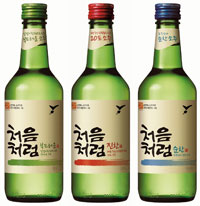
Year-end Soju War
Liquor makers engage in fierce marketing battle

Domestic soju makers are waging a full-scale war against one another in order to get the upper hand during the peak season.
The heated competition comes as Koreans consume larger volumes of soju, traditional distilled liquor, in December compared to other months as many go on binge drinking at one year-end party after another.
Companies hire popular celebrities to have them promote products on air and in cyberspace, as well as organize a wide range of marketing activities to encourage consumers to choose their alcoholic beverages over those of competitors.
According to the liquor industry Thursday, Hite-Jinro, the country’s largest soju maker, and second-largest Lotte Chilsung have been engaged in fierce competition to boost their market share at the expense of their rivals in Seoul and its adjacent areas.

In Busan and its surrounding areas, regional soju companies ― Daesun and Muhak ― are also fighting for supremacy.
Currently, Hite-Jinro’s flagship product Chamisul accounts for about half of Korea’s entire soju consumption, while Lotte Chilsung’s Cheoumcheoreom takes up about 15 percent. In Seoul, Incheon and Gyeonggi Province, Chamisul accounts for around 60 percent of the market, with the remaining 40 percent for Cheoumcheoreom.
“We have successfully completed the corporate reorganization following the integration of Hite and Jinro. This has begun creating positive synergy, enabling our flagship soju Chamisul to expand its market share over the past few months,’’ a Hite-Jinro spokesman said. “To capitalize on the year-end peak season, we will mobilize all possible resources to boost Chamisul sales.’’
Soju consumption has remained stagnant throughout the year due largely to the prolonged economic downturn. To make up for the sluggish sales through November, soju makers have rushed to introduce a wide range of marketing campaigns.
“We sell about 10 percent more in December compared to other months. So, it is important to maximize December sales. We launched a marketing blitz called Chamisul office attack, which offers free snacks to selected offices,’’ the spokesman said.
He said the company will continue to have Psy, who has risen to international stardom with his global hit “Gangnam Style,’’ promote Chamisul. It hired the rapper as a promoter in October when he downed a bottle of Chamisul on stage in Seoul.
Thanks to the Psy effect, its nationwide market share has exceeded 50 percent.
In response, Lotte Chilsung has hired three female K-pop idols to have them promote Cheoumcheoreom as part of its year-end marketing blitz. They are Gu Ha-ra of the girl group KARA, Hyo-rin of Sistar and Hyun-a of 4minute, replacing pop star Lee Hyo-ri, who advertized Cheoumcheoreom for past five years.
“For five years during which Lee Hyo-ri advertised for us, over 2 billion bottles of Cheoumcheoreom were sold. She also helped us boost its market shares to over 15 percent,’’ a Lotte Chilsung spokesman said.
“On Dec. 1, we uploaded video files on the Internet featuring three singers promoting Cheoumcheoreom, together or individually. They have already been viewed by more than 300,000 people,” he said.
He said when the number of viewers hits 1 million, Lotte will award selected people with a car, iPad and other gifts through a draw.
“We also plan to hold promotional events in which several groups of office workers will be chosen to receive cash for office get-together parties. Those interested should check our website,’’ the spokesman said. “Through these and other aggressive marketing activities, we will push up our sales in Seoul and surrounding areas to over 50 percent this time.’’
In the southern port city of Busan and South Gyeongsang Province, Daesun and Muhak are engaged in a tug of war to secure larger market shares.
Daesun’s flagship soju C1 used to account for over 90 percent of the market. But its shares have come down to about 40 percent as Muhak encroached upon its territory with “Good Day.’’
The two companies are battling hard to get an upper hand by offering sales incentives to discount stores and other retail outlets among other promotional measures. <The Korea Times/Lee Hyo-sik>


